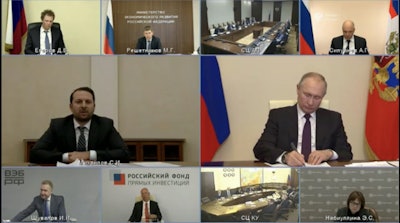
Sergey Mikhailov, CEO of Cherkizovo Group, took part in a meeting on measures to boost investment activity held by President Vladimir Putin on March 11. Speaking at the event, Mikhailov shared his thoughts on ways to increase meat sales in Russia and abroad.
The meeting was attended by government members, ministers, heads of public associations, and CEOs of major Russian companies. In his remarks, Mikhailov first thanked the president and the government for a favorable business environment, which attracted over RUB1 trillion (US$14 billion) of investments in the meat industry alone over the past 15 years, ensuring national food security and contributing to import substitution.
Speaking of the industry’s prospects, Mikhailov emphasized that Russian meat products have significant export potential. He believes that going forward, Russia is well positioned to become a major meat exporter in addition to being the leading exporter of grain.
“They are starting to take our export capacity seriously and are even somewhat apprehensive of it,” said Mikhailov.
He also mentioned some of the hurdles hindering the industry development, including the "shocking rise of production costs," due to record high grain and oilseed prices. Also alarming is the drop in the consumer purchasing power amid the pandemic-related restrictions on business activity. According to Mr. Mikhailov, both of these factors may lead to reduced consumption and production. He pointed that the average per capita meat consumption in Russia is currently 77 kg, but it could potentially increase to 82–83 kg, which is the per capita average in Europe.
A targeted social support for low-income citizens could help boost consumption by providing yet another regulatory mechanism for cushioning large fluctuations in food prices and balancing the consumer basket, said Cherkizovo’s CEO.
"Additionally, it will promote quality diet and help improve people’s health, leading to lower individual and government expenses on medical care,” noted Mikhailov.
This way of bolstering demand will give another powerful impetus to the agricultural industry over the next five to ten years, creating new jobs and raising additional investment, concluded Cherkizovo’s CEO.

















